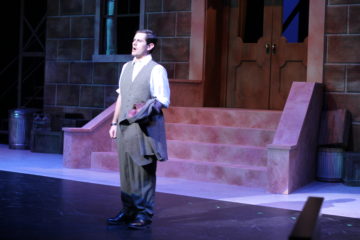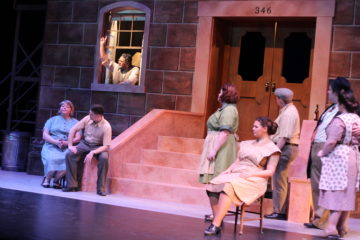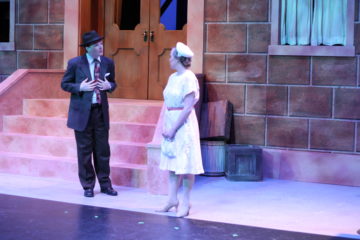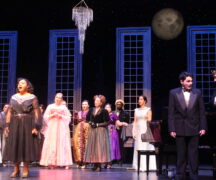By DAVID DUPONT
BG Independent News
The brownstone at 346 on an anonymous street on New York’s Lower East Side is the home to seven families of motley ethnicity.
“Street Scene,” the opera they inhabit, brings together music of the Old World and New to express their joys, hopes, passion, fears, and desperation.

Mark Tenorio as Sam Kaplan sings “Lonely House.”
The 1946 collaboration of composer Kurt Weill, poet Langston Hughes, and playwright Elmer Rice opens Friday at 8 p.m. in the Donnell Theatre in the Wolfe Center for the Arts on the Bowling Green State University campus. A matinee performance will be presented Sunday at 3 p.m.
Advance tickets are $15; all tickets are $20 the day of the performance. Call 419-372-8171, go online at bgsu.edu/arts, or visit the box office in the Wolfe Center to purchase tickets.
“Street Scene,” said Kevin Bylsma, coordinator of opera at BGSU, “is a great amalgamation of operetta, opera and musical theater that tells a poignant story that resonates as much today as it did in 1946.”
The tale of immigrants tossed together in a strange, sometimes hostile place had such resonance that guest director Nicholas Wuehrmann considered setting this version in contemporary times. There’s the “universality of the themes of love, relationships, the struggle of the immigrant population, prejudice, just every day life and the struggle to get along, and dreaming and hoping,” the director said. “It reminds me of the people I know in New York.”
He passed on the idea, trusting the audience will relate regardless of the time period.
All the characters have their own struggles, and the show highlights them in song.

Abraham Kaplan as played by Aaron Meece(in window) argues with a neighbor.
In the opening we hear the janitor (Brett Pond) and Anna Maurrant (Alicia Yantosca) sing of their dreams. His are expressed in a grinding blues number “I Got a Marble and a Star,” sung as residents ask him about repairs that need to be made. Anna expresses her desires in a passionate aria in which she declares that “I will always believe there will be a brighter day.”
For her that “brighter day” may include the milkman Sam Sankey (Jarrod Davis) with whom she’s carrying on a not-so-secret affair. The neighbor ladies – Emma Jones (Hillary LaBonte), Greta Fiorentino (Elizabeth Vogel), and Olga Olsen (Betsy Bellavia) – gossip about it in the bouncing “Get a Load of That.”
All the play’s drama plays out in front of the brownstone.
While the setting roots the production in 1946, many of ideas could come from today.
That’s true when Anna’s husband Frank Maurrant (Otis Jeffries) and Eastern European Jew Abraham Kaplan (Aaron Meece) argue about politics, and the hopes and futility of class struggle. The joining of the personal and political come through when Frank sings the folk-song-inspired aria “Let Things Be Like They Used to Be.”
Lippo Fiorentino (Nathan Wright) shows up to sweeten everyone’s day with ice cream cones. In the show’s most lighthearted number, a sextet of neighbors – including Carl Olsen (Nick Kottman) and George Jones (Daniel Baumgartner) – sing the praises of ice cream in a Puccini-like ensemble.

Harry Easter (Ben Ganger) tries to convince Rose (Kate Pomrenke) to become his mistress.
The orchestra, directed by Emily Freeman Brown, knits these disparate elements together. Some passages of spoken dialogue are underscored by the strains of the orchestra, giving the scenes a cinematic touch.
Weill’s deployment of a variety of styles is more than pastiche; each number fits the characters’ aspirations.
That’s evident when the show’s two young lovers Sam Kaplan (Mark Tenorio) and Rose Maurrant (Kate Pomrenke) finally unite on stage after eluding each other for most of the first act. They share a sentimental duet about meeting in a park. But for all their desire to be together, there’s plenty tugging them apart. Both are ambitious young people at the mercy of life’s vagaries.
That comes through on Sam’s haunting ballad “Lonely House.”
Rose works in a real estate office and must fend off her boss Harry Easter (Ben Ganger) who promises to set her up as a Broadway star and his mistress. Rose declines his offer, but has second thoughts as she confronts the hopelessness of her situation.
Adding a bit of ribald levity to the end of Act 1 are the jitterbugging couple Dick (Quintin Bouillion) and Mae (Katlyn Iacovino). It’s a lively depiction in dance of a young couple out of control.
All these threads unravel as the action unfolds in the second act. The resolution is more operatic than musical theater with that better world yet to materialize. Still for most of the characters life in the brownstone goes. They will keep dreaming. That’s certainly a theme that still hits home.





